|
|
|
Sort Order |
|
|
|
Items / Page
|
|
|
|
|
|
|
| Srl | Item |
| 1 |
ID:
177705
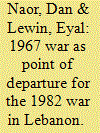

|
|
|
|
|
| Summary/Abstract |
Israel’s 1982 war in Lebanon is one of the most controversial events in its history. It is considered the war of Prime Minister Menachem Begin and his defense minister, Ariel Sharon, and hence a war of choice. One of the historical questions concerning that war revolves around its origins. The widespread assumption is that the roots can be found in 1981, the year in which Israel was on the verge of war with both Syria and the PLO. However, this article claims that the 1967 Six-Day War was the point of departure to the 1982 Lebanon War when the PLO settled in Lebanon. The issue of the origins of the 1982 war is not an exclusively historiographic matter. It has broader implications concerning the nature of the war. If the roots of the conflict can be found in 1967, then the war was a result of a prolonged process. Indeed, Israel started the war, but it was only after other options that it exercised had failed. Hence, it was not at all a war of choice.
|
|
|
|
|
|
|
|
|
|
|
|
|
|
|
|
| 2 |
ID:
177698
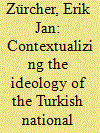

|
|
|
|
|
| Summary/Abstract |
The national resistance movement that emerged in Anatolia and Thrace immediately after the end of World War I and that was eventually successful in overturning the peace settlement imposed on the Ottoman Empire by the victorious Entente, has become such an important part of the history of the emergence of the Turkish nation state, that it is studied almost exclusively in that context: as republican prehistory. As a result almost no effort has been made to locate it within the major global developments of the era. This article tries to remedy this by analysing statements coming out of the resistance leadership over the years 1918-1921 to establish where it fits the ideological currents of the day. It concludes that four major inputs can be discerned: loyalty to the Ottoman monarchy and state; Muslim nationalism; Wilsonian self-determination, and Boslevik-inspired anti-imperialism. These influences were not mutually exclusive. Apart from being influenced by contemporary ideological currents, the National Movement was also an influencer: as a movement to preserve an existing state (and not to create or carve out a new one) it was also a pioneer of the revisionist movements of the interbellum that aimed to undo the Paris peace arrangements.
|
|
|
|
|
|
|
|
|
|
|
|
|
|
|
|
| 3 |
ID:
177697
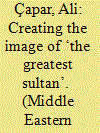

|
|
|
|
|
| Summary/Abstract |
This article aims to demonstrate the role of the children’s periodicals and magazines in the process of formation of the divine and the greatest sultan character in the minds of children between 1876 and 1908. By examining seven newspapers and magazines from that period, this article points out that these materials emphasized merciful, generous, protective, progressive, reformer, religious and powerful sultan images, which played a considerable role in indoctrination and political socialization of children. In this way, as this article argues, the regime tried to form primarily loyal, and then moral, religious, and well-educated generations who would support the regime’s values and norms. The close examination of the children’s periodicals indicates how the patriotism was closely connected to loving and obeying the rules and laws of the owner of the state, which reduced the meaning of patriotism to being loyal to the sultan, praying for his health and continuation of his rule, and celebrating his birthday. While elucidating the children’s periodicals, this article also provides a glimpse on the bilateral relations between the regime and the publishers and the censorship policy of the period.
|
|
|
|
|
|
|
|
|
|
|
|
|
|
|
|
| 4 |
ID:
177702


|
|
|
|
|
| Summary/Abstract |
The notion that development towns, founded at the dawn of the state of Israel, have become slums for North-African Jewish immigrants as part of a deliberate policy that served the status interests of the veteran, dominant Ashkenazi population, is a common perception among some scholars, which has recently taken root among the Israeli public, as well.
|
|
|
|
|
|
|
|
|
|
|
|
|
|
|
|
| 5 |
ID:
177700
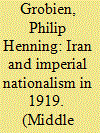

|
|
|
|
|
| Summary/Abstract |
Interposed between the Constitutional Revolution and the rise of Reza Khan, Iran began a foreign diplomacy that asserted a nuanced nationalism. After the devastation of the First World War, Iran sent a commission to the Peace of Paris. There, Iran put forward a nationalist programme which sought a sovereign and independent Iran, and the return of territory lost since 1828. Whilst many facets in this nationalist programme had been articulated before 1919, it is the consolidation within one programme which makes this programme unusual. It was also the first time such a great number of specific territorial claims were made. This imperial nationalism, requires an assessment within the narrative of Iranian nationalism, and will be explored in this article.
|
|
|
|
|
|
|
|
|
|
|
|
|
|
|
|
| 6 |
ID:
177704
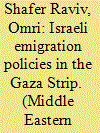

|
|
|
|
|
| Summary/Abstract |
This article uses archival sources to demonstrate how Israel crafted policies in the Gaza Strip following the 1967 War to reduce the size of its population, and how, in a two-year process, it reformed its policies to meet the needs of a long-standing occupation. Underlying these policies was the Israeli aspiration to annex the Strip without absorbing a large number of Arabs. The Israeli government developed an economic policy, based on high unemployment rates and low standard of living, aimed to encourage Gazans, and particularly refugees, to leave. In face of growing resistance, the Israeli government introduced in early 1969 a new economic policy, designed to improve the local economy, while continuing to encourage the emigration to other countries of educated youth. This new policy explains long-term demographic and economic patterns in the Palestinian society under a prolonged occupation and illuminate the Israeli mechanisms of control in the Gaza Strip.
|
|
|
|
|
|
|
|
|
|
|
|
|
|
|
|
| 7 |
ID:
177707
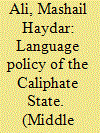

|
|
|
|
|
| Summary/Abstract |
This article examines and critiques the macro top-down constitutional language policy of the so-called the Caliphate State, often referred to by the acronyms ISIS and ISIL. Although Sharicah law, claimed to be the only source of the Caliphate’s laws, does not legislate local, official and national language policies, the Caliphate constitutionalises language policy through the misappropriation of Quranic verses. Article 8 of the constitution mandates the adoption of Arabic as the exclusive national and official language of the Caliphate project and its educational system. The monolithic policy exploits the symbiosis between Arabic and Islam to uproot the Islamic tradition of diversity and plurilingualism, advance its homogenising discourse, and globalise militancy. A religiously justified language policy is instrumental for the Caliphate in achieving cultural and linguistic cleansing, propagating its religious-political ideology and maintaining a strict assimilatory mould of indoctrination.
|
|
|
|
|
|
|
|
|
|
|
|
|
|
|
|
| 8 |
ID:
177695


|
|
|
|
|
| Summary/Abstract |
This article analyzes how a local notable on the eastern frontiers of the Ottoman Empire struggled for local power within the context of the early nineteenth century. Focusing on an era on the eve of the Tanzimat, this article seeks to indicate how the local dynasty of Muş – Alaaddin Pashazades – sought not only to maintain but also to strengthen their power and influence by taking advantage of their imperial and trans-imperial networks. Based on a variety of primary sources from Ottoman and British archives, this article explicates how in an age of fiscal, military, and administrative transformation, Emin Pasha from the Alaaddin Pashazades consolidated his power by skilfully manipulating inter-imperial wars, regional revolts, borderland and tribal matters with Iran, and the military reforms of the era. Providing a snapshot from an eastern sub-province of the Ottoman Empire, this article hopes to contribute to studies which deal with the multi-dimensional relations between imperial powers and provincial notables.
|
|
|
|
|
|
|
|
|
|
|
|
|
|
|
|
| 9 |
ID:
177694
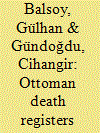

|
|
|
|
|
| Summary/Abstract |
This article presents an analysis of the first recognisably modern-style death registers in the Ottoman Empire. These were produced, in 1838–9, as a result of the state’s reaction to the cholera pandemic of 1831. This article shows how these registers were designed and structured, how they differed to those that preceded and came after them and so occupied a key point in the transition to the medicalisation of death and the import of Western-style statistical analysis. The article demonstrates how these registers offer details that can be used to build a picture of the social, economic and demographic profile of death in Istanbul in these years.
|
|
|
|
|
|
|
|
|
|
|
|
|
|
|
|
| 10 |
ID:
177706
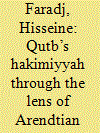

|
|
|
|
|
| Summary/Abstract |
The influence of Sayyid Qutb’s writing on political Islam and Islamist groups cannot be overstated. In constructing his radical political theory, special attention is usually given to Qutb’s two binary concepts, hakimiyyah (usually translated as divine sovereignty) and jahiliyyah (the condition of any place or society where Allah is not held to be the sovereign being). This article interrogates the commonly accepted notion that hakimiyyah is equivalent to divine sovereignty. Instead, I argue that Qutb’s hakimiyyah is best understood as an Arendtian form of authority (or a bounded sovereignty), even though Qutb’s project is essentially foundational while Arendt’s is antifoundational. Thus, rather than appealing directly to the authority of sharia, Qutb bounds hakimiyyah to a historical founding moment in the city of Mecca, the Meccan Quran, and the ‘unique generation’ during this period. Examining hakimiyyah through the Arendtian lens of authority substitutes the logic of sovereignty with authority based on a voluntary command/obedience relationship. This approach unsettles the binary logic of sovereignty that is often latently integrated into the academic literature on Qutb’s political writing. Consequently, examining Qutb’s hakimiyyah through the Arendtian lens of authority generates a consistent and coherent reading of his political thinking, which is usually deemed inconsistent and paradoxical.
|
|
|
|
|
|
|
|
|
|
|
|
|
|
|
|
| 11 |
ID:
177699
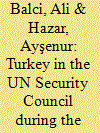

|
|
|
|
|
| Summary/Abstract |
Turkey served for five years in the UN Security Council during the early Cold War period. Throughout its service, first in 1951–1952, then in 1954–1955, finally in 1961, Turkey joined 201 voting sessions, and gave many statements on matters before the Security Council. The three electoral campaigns of Turkey for the temporary seat in the Council, and its voting and statement performance during a 5-year service are very informative not only about Turkey’s foreign policy but also about the behavior of small powers during the early Cold War period and the working of the Security Council, the most important international institution. Therefore, this article aims to provide a short story of Turkey’s election to and performance in the Security Council, analyze its voting preferences during temporary membership, and debate Turkey’s voting motivations.
|
|
|
|
|
|
|
|
|
|
|
|
|
|
|
|
| 12 |
ID:
177696


|
|
|
|
|
| Summary/Abstract |
This study aims to explore the social history of musicians in Istanbul that lived during the transitional period and experienced the sociopolitical as well as cultural changes from the late Ottoman to the early Republican periods, roughly from the turn of the twentieth century to the early 1930s. Collective biography analysis upon 257 musicians’ life narratives while revealing certain defining characteristics as well as atypical social aspects of musicians would also enable us to understand to what extent musicians adapted to change that they underwent. Thereby, the unconventional approach of this study lies in the analysis of the links between central policies and the ups and downs in musicians’ career trajectories. In other words, this study seeks to identify the ramifications of the wider sociopolitical transformations in the life narratives of musicians.
|
|
|
|
|
|
|
|
|
|
|
|
|
|
|
|
|
|
|
|
|